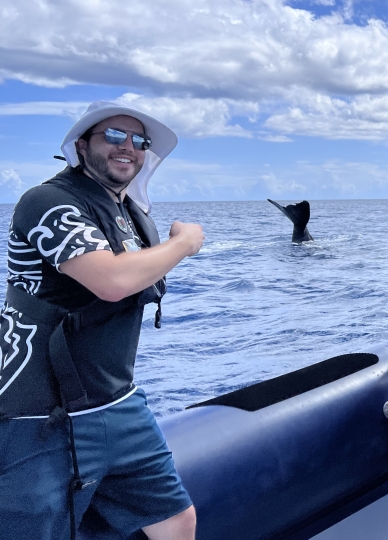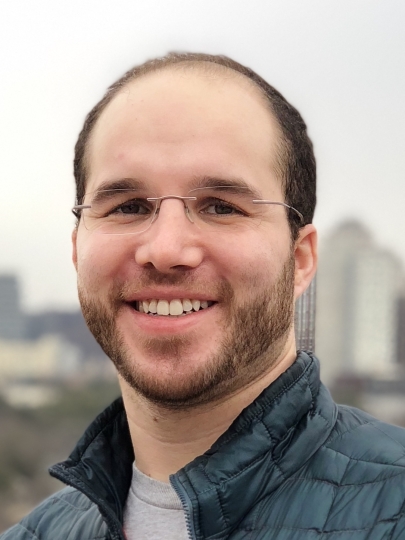Michael Bell, Ph.D. '21, tracks a whale with the Harvard Project Cetacean Translation Initiative, which uses machine learning and artificial intelligence to help translate sperm whale communication.
Michael Bell, S.M. ’18 and Ph.D. ’21 arrived at the Harvard John A. Paulson School of Engineering and Applied Sciences (SEAS) with a background in commercial and industrial products. He co-founded or worked for multiple companies following his undergraduate studies at Rose-Hulman Institute of Technology in Indiana, and at Harvard earned graduate degrees in materials science and mechanical engineering. His experiences at Harvard helped lead him to a big career change. Following graduation, he became program manager at the Harvard Project Cetacean Translation Initiative (CETI), which aims to decipher sperm whale communication by connecting leading research labs in machine learning, artificial intelligence, linguistics, marine biology, and robotics.
Could you describe your role at Project CETI?
I’m the CETI Program Manager at the Harvard Microrobotics Lab under Professor Rob Wood. I lead our robotics efforts on the overall project. Fundamentally, this involves developing a state-of-the-art whale tag that allows our machine learning and artificial intelligence colleagues to decipher sperm whale communication. The tags adhere to whales with custom-designed suction cups for a number of days, and contain sensors including an accelerometer, gyroscope, magnetometer, depth, light, electrocardiogram, and GPS to get as much contextual information as possible to assist in deciphering whale communication. Uniquely in the field, we autonomously deploy and recover these tags to whales with custom-built waterproof drones, with a goal to get hundreds of thousands of hours of data.
What makes communication and language so interesting, especially with sperm whales?
Sperm whales have the largest brain of any animal, and like humans, have a complex communication system and live in tightly knit family groups. Sperm whales produce social calls termed 'codas,' which are a series of clicks and sound similar to morse code, or a digitally produced signal. If we’re able to translate sperm whale communication, we’ve then developed a pipeline that can potentially lead to translating other species. Sperm whales are the aliens in our backyard, just waiting to be communicated with and understood more deeply. More importantly, we should be protecting and providing sanctuary for these amazing animals, and our focus on them — as well as other ocean creatures — sorely needs more resources and exploration.
Do you enjoy the research that you’re doing?
I love it. It’s a wacky and crazy problem that is a once-in-a-lifetime opportunity to lead, and a project that would not come across your desk if we weren’t in a leading research lab.
Most of your previous work experiences seem to be based around consumer or industrial products. Has it been challenging switching to a project based more around research than product?
Two of the previous startups I co-founded, Voxel8 and Electroninks, had multidisciplinary engineering teams working towards producing a product. Uniquely to Project CETI, and rare in an academic setting, I run our project as though it were a start-up. We have customers: machine learning, artificial intelligence, and linguistics labs who need hundreds of thousands of hours of data with as much contextual information as possible. We have an evolving product: our whale tag, which has a mechanical, electrical, software, and manufacturing team - mostly consisting of students and postdocs. And we have an operations team in Dominica that takes our tags, deploys them on whales, recovers the data, charges, and redeploys them. We have peculiar travel, purchasing, and operation needs such as figuring out how to fly large drones at Harvard, negotiating our own insurance, getting permission to use athletic fields and parking lots, and having every CETI member get their FAA commercial drone pilot license.
What drew you to Harvard?
Harvard’s multidisciplinary engineering Ph.D. made it stand apart from other schools. At Harvard, there are no engineering departments, and Ph.D. students can span disciplines such as robotics, materials, mechanical, and electrical engineering, which is where I find some of the most exciting engineering problems can be solved.
Where did the inspiration come from for you to pursue CETI as an area of research?
My Ph.D. was in underwater robotics – specifically, a sea-star-inspired robot that had a novel adhesion and locomotion system capable of navigating complex underwater structures. Underwater robotics and adhesion are rapidly growing areas of research, as there is so much to learn and explore. Project CETI has tough challenges in this regard – sperm whales can reach 1,200 meters while hunting for food, and our tags must withstand these punishing depths and stay adhered to the whale dive after dive.
Do you find yourself still drawing on your education after graduation?
In many ways yes, but in other ways, it has just prepared me to tackle new engineering challenges quickly and with a robust scientific method.
Press Contact
Matt Goisman | mgoisman@g.harvard.edu

